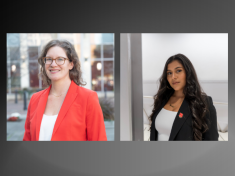This past year, the Immigrant Justice Clinic (IJC) saw one of its longtime clients become a U.S. lawful permanent resident (“LPR”) after many years of advocacy. Stephen* was 17 years old and in foster care when he first came to the IJC more than a decade ago. Born in West Africa, Stephen had been brought to the United States as a child by his father. When their visas expired, Stephen’s father left the country and sent Stephen to stay with an uncle in Camden. Over the next four years, Stephen’s uncle subjected him to horrific abuse. Stephen recalls being treated as a “slave child” who was made to sit on the floor naked and was beaten every day. Stephen escaped when police came to the home, discovered the abuse, arrested his uncle, and took Stephen into foster care.
Based on Stephen’s reported abuse and assistance to prosecutors in bringing charges against his abuser, the IJC was able to secure him a U visa – a temporary immigration status available to certain crime victims – in 2020. Then, after three years with his U visa, Stephen became eligible to apply for LPR status, also known as a “green card.” The IJC prepared and filed Stephen’s green card application during the Fall 2023 semester.

To show that he was eligible for a green card, Stephen would have to prove, among other things, that he had remained physically present in the United States since the date his U visa was granted. Typically, a person does this by providing copies of pay stubs, medical records, rental agreements, bills – all things that make up the “paper trail” of one’s life. But this proved to be a major challenge for Stephen, who had struggled in recent years to maintain steady employment and stable housing. When USCIS sent a letter last November seeking more evidence of Stephen’s continuous presence and good character, IJC senior staff attorney Elizabeth Yaeger and work study student Yomaira Tarula-Aranda worked closely with Stephen to meet this burden. Together, they tracked down employment records from several states where the client had lived, affidavits from community members, a single hospital record, and other documents to prove that Stephen met the requirements for lawful permanent residence.
Finally, at the end of March, Stephen received the news that his long journey to permanent legal status was complete. With his green card in hand, he is now able to live securely in the country that he has long called home. Stephen hopes to one day start a family and give back to his community while continuing to heal from his trauma. He is extremely grateful to the many Rutgers students, faculty, and staff who have helped make these dreams possible.
*Not real name
One of the goals of the Rutgers Law Strategic Plan is to deepen our connections with our communities through our clinical programs. Our strategy is to ensure that clinical offerings are informed by and responsive to community needs. Click here to learn more about our Strategic Plan.